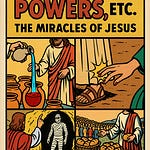Romans 12.1-2, 9-16
Pay attention to the passive voice.
“Our society is broken, pretty much, but there will be a time when these times will be made right.”
“These times will be made right," said the principal of Goose Creek High School in Charleston, South Carolina.
“These times will be made right,” he said, just days after Dylann Roof stormed into Mother Emanuel AME Church on June 17, 2015 and shot, nine parishioners gathered for a Bible study. The scripture passage for that night’s meeting was chosen by Myra Thompson, Mark 4:16: “Others, like seed sown on rocky places, hear the word and at once receive it with joy.”
One of the nine victims was Sharonda Coleman-Singleton, the track coach at Goose Creek High School. In addition to coaching, she was one of the pastors at Mother Emmanuel. After her murder, her boss at Goose Creek High School insisted to a reporter, “These times will be made right.”
Not, “We will make these times right.”
Instead, “These times will be made right.”
Pay attention to the passive:
“I appeal to you therefore, brothers and sisters, by the mercies of God to present your bodies as a living sacrifice. Do not be conformed to this world, but be transformed by the renewal of your minds.”
Remember—
Just as you do not number your sentences, neither did the apostle Paul number his own. The epistle’s chapter and verse divisions are a later addition. The Letter to the Romans is not an encyclopedia with gospel here and law there; the Letter to the Romans is a single gospel announcement from beginning to end. Thus, chapter twelve follows logically from the preceding passages and is not a sudden, jarring detour into To Do List Christianity.
This is what the therefore is there for.
The therefore is there in order to signal to Paul’s hearers that what follows relies logically upon what has come before.
As Fleming Rutledge argues:
“Romans 12, filled with imperatives, is much misunderstood because it is so frequently lifted out of its setting, with “therefore” ignored.”
Taken in isolation, this passage indeed sounds prescriptive. Without the therefore there, listeners might conclude Paul is suggesting that Christ’s shed blood is not enough to save sinners. Lifted out of its context, Romans 12 sounds like Paul is now preaching glawspel, muddling the gospel with the law.
A genuine, justified Christian must now do this, it can sound like Paul is saying.
A genuine, justified Christian must love enemies, must bless those who curse them, ought to be patient in suffering and should be ardent about their faith.
In fact, interpreters typically do preach the chapter’s second verse as if it heralded a break in Paul’s thought, being popularly construed as Paul’s move from proclamation to instruction.
As Fleming Rutledge writes:
Positing such a break in Paul’s thought “does not do justice to the radical nature of Paul’s gospel and it drains off much of the impact of what has gone before; indeed, it undermines it. Chapter 12 is grounded so firmly in the previous exposition that it cannot, or should not, be separated from it.”
The therefore is there for you to know that what proceeds is inseparable from what precedes it.
And the passage which immediately precedes Romans 12.1-2 is the gospel doxology that concludes Paul’s reflections on the Israel of God and the cosmic scope of Christ’s work. Just before this passage, Paul’s proclaims unequivocally the universality of God’s redemptive reach, “From him and through him and to him are all things. To him be glory for ever. Amen.”
From him and through him and to him are all things.
This immediately precedes “therefore.”
And the primacy of the divine agency could not be less ambiguous.
Only four days after Dylann Roof stormed into Emmanuel AME and left six black women and three black men in a bloody pile in the church basement, the leaders of the congregation concluded that the only way to press forward was for them to go back to exactly what they'd done before, to do the Sunday after the shooting, what they had done the Sunday previous, worship the Lord Jesus Christ and proclaim the only word which has the power to open the future as promise rather than threat.
Preaching that Sunday at Mother Emanuel AME Church, the Reverend Norval Goff, an elder in the African Methodist Episcopal Church, proclaimed that, “Through our proclamation of the gospel, on this day, a message will be sent to Satan.”
Once again, take note of the grammar.
In speaking gospel, preacher Goff pivoted to the passive voice.
“Through our proclamation, a message will be sent to the Enemy, the Prince of Lies, the Power of Sin and Death.”
A message will be sent.
The worshippers at Mother Emmanuel Church were not the ones sending the message. Later in his sermon, his voice roaring, Reverend Goff added, “Something wants to divide us, black and brown and white, but no weapon formed against us shall prosper.”
Notice:
The preacher didn't say Dylann Roof wanted to divide us.
He didn't say racists and bigots want to divide us.
“Something wants to divide us,” he said.
There's another agency at work in the world.
As Paul writes to the church at Ephesus— which should be everyone’s memory verse during election season:
“For our struggle is not against flesh and blood, but against the rulers, against the authorities, against the powers of this dark world and against the spiritual forces of evil in the heavenly realms.”
Speaking of this other agency, that same Sunday outside the church, the Reverend Brandon Bowers, who is white and who was the pastor of Awaken Church, said, “What the Enemy intended for evil, God is using.”
“God is using us,” he continued, “for good despite what the Enemy wills.”
Although this preacher used the active voice rather than the passive, he nevertheless made humanity the object of his sentences. Reverend Bowers insisted, “God is using us for good.”
We are being used by God for good.
The Sunday after the mass shooting, the service at Mother Emanuel Church began with a hymn, “You are the Source of my strength and you are the Strength of my life.”
Meanwhile—
As they sang at Emmanuel AME, the family of twenty-one year old Dylann Roof worshipped at St. Paul's Lutheran Church in Columbia, South Carolina. The pastor of St. Paul's read the names of the victims and the congregation prayed for them and their families.
The victimizer's family prayed for the victims and their families.
About the victimizer's family, the preacher at St. Paul told his listeners later— once again, pay attention to the passive— “They are shattered, but through their faith, they are being made strong.”
They are being made strong.
We are being used by God for good.
These times will be made right.
“From him and through him and to him are all things.”
It’s on the basis of this divine agency that the apostle makes his appeal, “Therefore, brothers and sisters…Do not be conformed to this world, but be transformed by the renewing of your minds, so that you may discern what is the will of God—what is good and acceptable and perfect.”
In turning to the new life in Christ, Paul proclaims “that there is a power at work in redeemed human nature that is beyond human possibility.”
Paul is not prescribing behavior for those in Christ Jesus.
Paul is pointing to a power at work upon those in Christ Jesus.
A power beyond human possibility.
Paul makes clear he’s speaking of such a power by the word he selects, the same word the Gospels use to describe Jesus upon Mount Tabor when the Lord changes before Peter and the sons of Zebedee into whiteness and lightness and brightness.
The word Paul uses in verse two, the word translated into English as “be transformed” is actually the word metamorphosed.
Transfigured.
Do not be conformed to this world.
Be transfigured.
Even on Mount Tabor, transfiguration is a change only God can wreak.
Fleming Rutledge elaborates on this transfiguring power thusly:
“Conformity suggests being formed with, or by, this age of Sin and Death — being shaped by it and therefore lacking freedom — the situation personified in Romans chapter 5 as “Adam.” How do we escape such captivity? A typical response to this question would be to urge greater religious or moral effort.
But that is not the gospel.
How then are we to understand the source of transfiguration?
The Greek word translated “renewal” here means something much more drastic. Paul’s word anakainosis actually means “being completely taken over.” This is not a process that God begins in us, followed by his stepping aside to observe how we will respond. God is the power of this process from first to last. Put another way, renewal, in Paul’s gospel, can be defined also in terms of dikaiosyne, not simply to be declared righteous but to be actually made righteous by the rectifying power of God.
What may sound to us today like an imperative (“be transformed”) is actually a sort of description of something that has already happened in Christ. Romans 12 is preceded not only in the literal sense by the preceding chapters, but by the story of Christ Jesus, the second Adam, and our incorporation into his reign through the baptismal “takeover.” The imperative is not only dependent upon but organically produced by the indicative, or declarative, proclamation: you have died with Christ; you have now been transferred into the new sovereignty with its guarantee of participation in the righteousness of God.”
In other words—
You don’t need to set a table in the presence of your enemies in order to be justified!
Whether you believe it or not, whether you can see it or not, because you are justified you already are becoming a person who sets a table in the presence of your enemies.
You are!
Already you are being made into a person who hates what is evil and holds fast to what is good. Already you are being transfigured into someone blesses those who curse you and gives drink to those who thirst.
“From the triune God and through the triune God and to the triune God are all things.”
All things— including you.
Just so, God is transfiguring you.
There is a divine agency at work in the world.
The Sunday after Dylann Roof shot nine at Emanuel AME Church in Charleston. Members of Citadel Baptist Church, a white Southern Baptist church with a long and complicated relationship with racism. Members of Citadel Church walked the mere steps from their church to Emanuel Church, and they placed purple daisies around the front of Emanuel. The Reverend David Walker, pastor of Citadel Baptist Church, explained the gesture thus to the New York Times.
Pay attention to the passive.
“Something compelled us to do this,” he said.
“From him and through him and to him are all things.”
Thus far in the Epistle to the Romans, Paul’s relentless emphasis has been on what God does. Why should we suppose that when he gets to this point in his letter, the apostle is suddenly talking about us? About what we do?
The therefore is there for you to know that the promise is the last word.
The gospel is not followed by new law.
Jesus is not a new Moses.
The therefore is there for you to rejoice in the promise that you do not need to become a new you but rather— pay attention to the passive— you are being made new.
By God.
Through the mercy of God, Paul says.
And this no pious cliche, for the word Paul uses dia refers to the instrumentality of God. Only by the merciful activity of God upon you can you be conformed not to this world but transfigured into Jesus Christ.
The therefore is there to point to a claim far more mysterious than we often hear. Paul is not simply and suddenly urging his auditors to emulate and imitate Jesus. Good luck— Jesus did not even have an easy time being Jesus. How could you possibly emulate and imitate Jesus on your own?
No, Paul is not exhorting you to imitate Jesus.
Paul's already told you before, back in chapter six, that through water and the Spirit you are now in Christ Jesus by baptism. Paul does not mean that as a metaphor. You are in Christ. And therefore— pay attention to the passive—you are being shaped you into Christ-likeness.
Patience and suffering.
Blessing those who curse you.
Perseverance in prayer.
Genuine love.
This is NOT a Code of Conduct.
The cross of Jesus Christ is the end of To Do List religion.
These verses are neither exhortations nor expectations. They are attributes of Christ. They describe who you are in Christ. They proclaim who you are being made by a power beyond every human possibility.
What Paul says here in Romans merely restates what Paul says to the Philippians, “The God who began a good work and you will, in the fullness of time, bring it to completion.”
Not—
You must now bring it to completion.
God will bring— is bringing— it to completion.
And what Paul says in chapter twelve is what Paul already said in chapter one. The gospel— what we announce in word and sacrament— is the power of Almighty God to invade our world and to take over our minds completely, so that all things are rectified, put right according to Christ.
In 2017, I attended a friend’s graduation from Wesley Theological Seminary, held at the National Cathedral. The pastor of Emmanuel AME Church in Charleston, killed by Dylann Roof, would have been in the graduating class. The school awarded Reverend Pinkney’s degree posthumously. And when it came time for his name to be read, they invited his wife, Jennifer, forward to receive his diploma and speak.
Mrs. Pinkney acknowledged that the ceremony was a bittersweet moment for her. She painted a picture of her husband asleep in his man cave, his coursework still on his lap night after night. And then she confessed that she had no idea what to say to those gathered there in the cathedral.
She had no idea what to say.
“But then,” she said, “but then I was hit with the words to share.”
I was hit with the words to share.
Not—
I hit upon the words to share.
I was hit by God.
And what followed was plain and simple and unremarkable and, without a doubt, the living word of God.
The divine agency at work.
More so than the official sermon that had come before she spoke— a glawspel sermon that had been an exhausting litany of musts and shoulds— what Jennifer Pinckney from Emmanuel AME Church said was power beyond every human possibility.
Look—
You can't become unflagging in your zeal by exerting more zeal. You don't persevere in prayer by practicing prayer. Your love doesn't become genuine through effort of your own. You don't achieve patience and suffering by enduring it. Blessing those who curse you doesn't come about by you biting your tongue.
None of it is possible for you to do!
But all of it is possible for the living God to do in you!
The therefore is here in chapter twelve in order for you to remember that the Christian life is pointless if we do not serve a living God.
Friday a week ago, I called on Mike Moser, our cemetery manager, before I headed out of town to preach a series of sermons in Des Moines, Iowa. As many of you know, Mike’s long battle with cancer is nearing its end. Still others of you will not be surprised that what Mike wanted to hear from me was what Mike always wanted to hear. Just as his countenance is often dark, even before he was dying Mike feared death. He feared what would happen to him after he died.
“Mike, Jesus lives for you!” I promised him on the phone last Friday.
“Please keep proclaiming it,” he said, “My trust in it only lasts the time it takes to go in one ear and out the other.”
After a long pause to catch his breath or to gather his thoughts, despite his despair, Mike said, “I can’t say much about the constancy of my faith, I’m afraid. But I will say I am not who I once was.”
Pay attention to the passive.
Mike said to me, “This much I know. I have been changed.”
“Transfigured,” I should have replied.
Let me hand over the goods, the good news:
What may sound to you today like an imperative (“be transformed”)— it is actually instead a description of what God has done and is doing and will do in you.
In spite of what you see in the mirror, no matter how you might grade your performance of the Christian faith, despite how your spouse or your neighbor might rate your discipleship, regardless of how quick your tongue is to curse or how much your zeal lags these days, take God at his word today.
Take God at my word.
And pay attention to the passive:
You ARE being changed.
You ARE being transformed.
You ARE being transfigured.
YOU are.
There is a power at work on you.
There is a power beyond any human possibility at work in you.
There is no To Do List.
There is only the divine agency at work in you.
In you.
And this good news is as literal as it gets, for in a moment that Power beyond human possibility will make himself an object on your lips and in your bellies.
There is a divine agency at work in the world.
You need look no further than loaf and cup.













